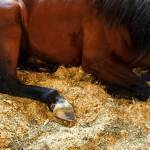Fecal Microbiota Transplant for Horses with Colitis

Transferring fecal microbiota from healthy adult horses to adult horses with severe diarrhea, also known as colitis, conferred no clinical benefit, according to one study.
Colitis is a life-threatening condition in horses with an estimated mortality rate of 25-35%. No cause for the diarrhea is identified in approximately half of all cases, which means most horses are treated symptomatically. Standard therapies include fluid therapy, nutritional support, and control of inflammation to avoid endotoxemia and sepsis, a whole-body infection. Antibiotics are used on a case-by-case basis.
“In humans, fecal transplants are successfully used to treat diarrhea due to recurrent Clostridioides difficile infections and other gastrointestinal disorders. The rationale is simple: transfer the microorganisms present in a healthy fecal sample to help reestablish the microbiome in an ill patient,” explained Catherine Whitehouse, M.S., a nutrition advisor for Kentucky Equine Research.
In horses, fecal microbiota transplants (FMT) are performed in some clinical cases of colitis, depending on the practitioner’s treatment preference. Considered a symptomatic therapy, FMT may be used in combination with bismuth subsalicylate or activated charcoal. Few studies, however, support any of these therapies, including FMT.
Researchers retrospectively reviewed data from 111 adult horses treated for colitis at veterinary clinics. Thirty-seven horses were included in the FMT treatment group, and the remaining 74 horses were included as controls, not receiving FMT.*
To perform the FMT, manure was collected from healthy adult horses and soaked in water. That water was then delivered to the stomachs of colitis patients via a nasogastric tube. The following outcomes were measured:
- Days to improvement of feces or normalization of fecal consistency;
- Days to normalization of respiratory rate, heart rate, and temperature;
- Days to normalization of white blood cell counts;
- Days to improvement in appetite or attitude; and
- Survival to discharge.
“Horses in the control group that did not undergo FMT had shorter hospitalizations than horses in the FMT group. Other than this, no significant differences in outcome measures were identified,” Whitehouse noted. This does not mean, however, that FMT is ineffective.
According to the veterinarians, the lack of efficacy observed in this retrospective study may have been because FMT was only performed in hospitalized horses that had severe disease unresponsive to traditional therapies.
Given the potential ease and safety of FMT, further research is warranted, preferably using prospective studies. Moreover, information on preparing samples for FMT, storage, and handling of the feces, as well as the amount and frequency of administration should be investigated.
Digestive buffers are another product used for optimizing hindgut health.
“During times of hindgut disturbance, supplementing with a digestive buffer such as EquiShure helps neutralize the acidity of digesta. In turn, this supports the integrity of the intestinal lining and the microbiome as a whole,” explained Whitehouse.
EquiShure is a protected form of sodium bicarbonate delivered to the hindgut in a time-released fashion to combat subclinical acidosis and detrimental changes to the microbiome.
*Quattrini, C., R. Bozorgmanesh, P. Egli, and K.G. Magdesian. 2023. Fecal microbiota transplant for treatment of diarrhea in adult hospitalized horses-111 cases (2013-2018). Open Veterinary Journal 13(9):1135-1140.








